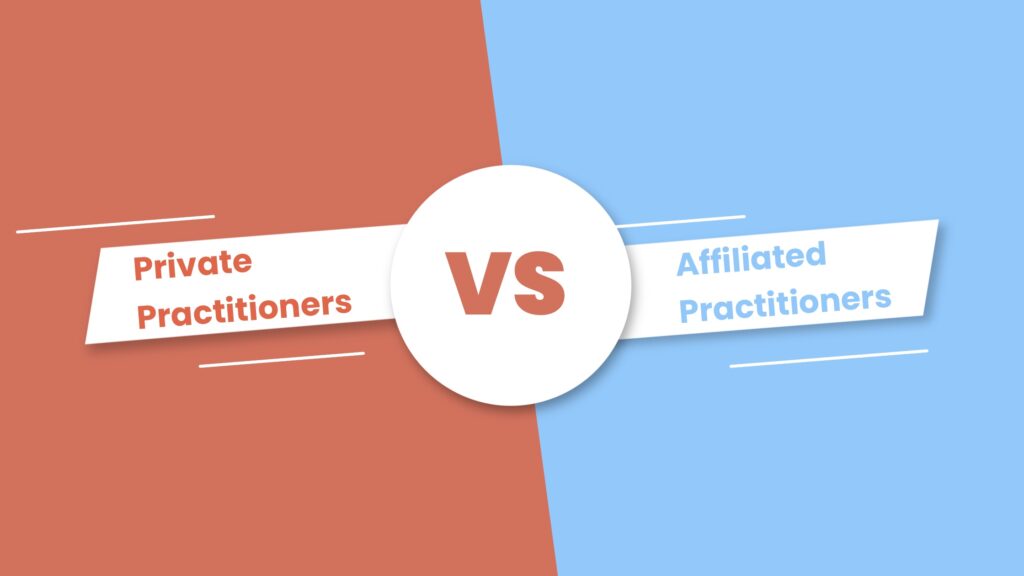Private Practitioners vs Affiliated Practitioners in the field of Mental Health – What are the challenges they face?

Counselling as a profession is slowly gaining attention as the importance of mental health increases in our society with every passing day. The trainee counsellor is exposed to all sorts of therapies and is motivated to learn more. Their next task would be to choose how they apply this knowledge. Counsellors are now presented with multiple options to choose their place of work. They can now work in corporations, educational institutions such as schools, colleges, etc., hospitals, and so on. They can work with an agency, a group practice, or even set up their independent practice.
Private practitioners are counsellors who earn all or part of their income directly from their clients by working professionally in the context of a therapeutic relationship. Here they are self-employed and rely on themselves to generate an income. Affiliated practitioners, however, are counsellors/ psychotherapists who are employed by an agency/corporation to provide counselling services. Affiliated practitioners may also be a part of group practices.
Being a therapist involves constant growth and learning. Students enrolled in counselling programs often aspire to open their private practice but it is also not unusual for students to want to gain experience by working for an agency/organization before they open their practice.
Having a private practice comes with its own set of pros and cons. It brings about a sense of independence and control over their operations. Private practitioners can decide their working hours and can choose to have other sources of income through part-time employment. It can also be a way of discovering one’s speciality in the field and becoming a well-known professional in the community. Private Practitioners are often found building their entrepreneurial side by tapping into their creative selves and finding out ways to promote their practice. However, there is a certain risk that private practitioners may abuse their freedom by overcharging their clients, offering poor services, or even subjecting their clients to abuse.
To quote Allen Ivey, “There is just a very small window for private practitioners to make big money”. One must possess a plethora of skills beyond counselling expertise. Few challenges that a private practitioner may face include.
- The counsellor’s practise is a business of its own. To facilitate growth, the counsellor should be well equipped with business skills in areas such as marketing, finance, hiring, etc.
- It is of key importance that the counsellor has a support network. The absence of support and isolation can take a toll on the counsellor’s mental health and may, in turn, affect their work.
- Balancing their increasing caseload and finding a way to make sure emergencies or a client in distress are covered when the professional is not available.
- Building a private practice takes a lot of hard work and patience and consistency are of importance. The individual’s commitment to their work is also a large determining factor.
Individuals who are fresh graduates from a Master’s program in counselling usually look towards working with an agency at first. These graduates don’t necessarily need a license to be employed. Working with an agency can bring the graduate their much-needed experience and exposure to the field of counselling and mental health. With benefits such as free supervision, fixed pay, paid leaves, insurance, etc. this appeals to the fresher with much ease. The counsellor has the opportunity to interact with their colleagues and engage in thought-provoking discussions. It can also be a way of finding one’s mentor/ guide in the field.
However, certain challenges arise when working with an agency such as:
- The counsellor doesn’t have a lot of freedom in choosing the clients they’d want to see. The agency assigns clients to the counsellor and the counsellor gets little to no say.
- The schedule of the counsellor often has little room for flexibility.
- It is not always that the values of the counsellor and the company align. There may be a certain difference of opinion in terms of their therapeutic style or technique. So, the counsellor’s expertise and values must be aligned with the agency they choose to work with.
- Agencies usually draft contracts which makes the counsellor obligated to stay with the agency for a certain period. Counsellors must read the rules and guidelines of the contract thoroughly before working with the agency.
To learn more on how to be a private practitioner, freelance with Shivtensity now! For more details, visit https://betterspace.care/
Written by
Kirtika N
Intern
Trainee Counsellor (MSc Psychological Counseling)
Reviewed by
Akshatha Jane Jesudasan
Psychologist (MSc Psychology with Clinical Specialization)
References
Gladding, S. T. (1996). Counseling: A comprehensive profession. Englewood Cliffs, N.J: Merrill.
Jessica. (2021, February 16). The Northrop Connection. Retrieved March 16, 2022, from https://jessica-northrop.mykajabi.com/blog/The7ProsofWorkingasaTherapistforanAgency
Thistle, R. (1998) Counselling and Psychotherapy in Private Practice: Professional skills for Counsellors, London: Sage.
Wheeler, S., & Hewitt, E. (2004). Counseling in higher education: the experience of lone counselors. British Journal of Guidance & Counselling, 32(4), 533–545.












